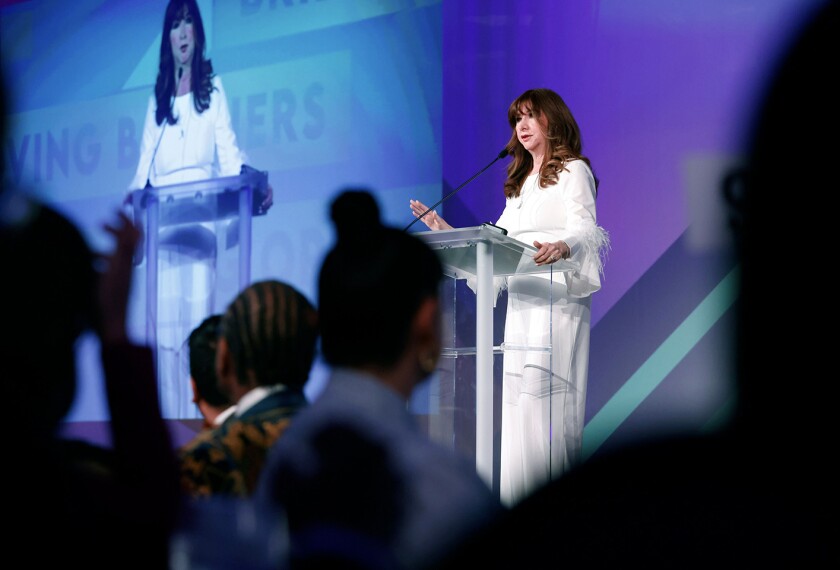Despite an inclination to shy away from political conflict—particularly with lawmakers who decide how much funding flows to public schools—superintendents are increasingly calling out what they see as insufficient state school aid.
Districts across the United States are staring down major budget shortfalls now and in the coming years as federal pandemic aid expires. Some face the compounding challenges of declining enrollment, outdated state funding formulas, and rising costs, all while students still have academic ground to recover following pandemic closures.
Dallas Superintendent Stephanie Elizalde and Andrea Castañeda, the superintendent of the Salem-Keizer district in Oregon, have both publicly called out state lawmakers in recent months for not providing more state education aid—Elizalde in her annual State of the District address and Castañeda in a video featuring her and other superintendents.
While both district leaders were pointed in their criticisms and pleas, they also say they’ve been intentional in their approach, targeting problems rather than individuals.
Neither one relishes conflict, but both said they felt a responsibility to advocate for their schools.
Below, in their own words, Elizalde and Castañeda offer some advice to district leaders on publicly advocating for their students, staff, and schools—especially when it requires holding policymakers to account. Their responses, which come from interviews conducted separately, have been lightly edited for length and clarity.
An approach to advocacy: ‘You can be vocal without being vicious’
Elizalde: Stay away from sentiments like ‘I think this person is responsible,’ because there’s no one person that’s responsible for the situation that we’re in. So I don’t think it serves us—and I definitely don’t think it’s a good model for my kids or for my team that I serve for me to model behaviors that are unbecoming.
I think you can be vocal without being vicious and I think conflict is unavoidable; it’s part of the process, but combat is optional.
Castañeda: Be equally attentive to what you’re trying to accomplish as you are to what your actions might accidentally damage or break. Indignation feels good in the moment that it motivates us, but indignation and self-righteousness do lasting damage to relationships. So, be clear and passionate but be measured in how you are levying blame or attributing responsibility for harm.
Be prepared for feedback, both positive and negative
Elizalde: I would say the most outward feedback in terms of people approaching me was actually very appreciative and very supportive. Perhaps sometimes, I can say some things that other people want to say but may not be in a position to be able to do that.
The negative feedback I got was probably if you went to my X [formerly Twitter], where keyboard warriors like to pile on. That was probably the most negative.
When I’ve even spoken with a couple of state reps or state senators who may not completely align with our beliefs in some areas, we’ve actually had pretty productive interactions, and they weren’t critical of my statements.
Castañeda: Although we really intended [the video] as a local appeal, I think there was something about three superintendents telling a story that felt emotionally resonant. That generated just a little bit of unexpected national interest.
I think there’s something about superintendents saying, ‘Something is happening. Please pay attention. Do something,’ that captured the feeling that superintendents are having across the country.
There’s something about this story that’s true in more places than we can count, and it is perhaps incumbent on people in those places to find their own way to tell their story, too. But it is a story that people are desperate to tell.
Find common ground with perceived opponents and be open to other perspectives
Elizalde: As cliché as it is, there is still a lot of common ground. I don’t believe that any person is trying to harm kids in public education. I think that the decisions that are being made ultimately are resulting in that, but that’s from my lens and my experience, so it doesn’t mean I’m right.
[When there is a public conflict with a lawmaker], I try to not just rely on one interaction or decision as a representation of who they are. I look to see if there are other opportunities to interact on things that we do have common ground on. Instead of having this dividing line that’s solid, it’s a dashed line, because sometimes we need to be able to move into the other person’s space and perspective.
We all have to try to listen for true understanding, and when that happens, I think the authenticity of who we are will transcend whatever the differences on a topic are and we connect as actual people.
Seek counsel from colleagues who can serve as more neutral observers
Elizalde: I surrounded myself with a lot of experienced superintendents who are willing to call me, or take my calls, and tell me from a third party’s perspective what is happening, where I might be not getting it right, or what might work better. So I’m trying to always learn and evolve from their expertise and experience.
I don’t think you can ever downplay the experience and wisdom of folks that have been in the seat for a long time.
Be mindful that others care and face their own challenges, too
Elizalde: Sometimes, educators will come to the table with a deficit mindset, and this philosophy of ‘I’m the one who cares more,’ which can put people in a very adversarial position.
I think you can be bold and I think you can be a champion for our kids and public ed. without having to come in with a chip on your shoulder, closed off to the idea that people might be trying to do the best by kids.
Castañeda: Everyone around us, especially everyone above us, is in their own impossible balancing act. There is not an endless amount of money, but there is a near endless amount of legitimate need. We can’t lose sight of legislators’ and policy leaders’ impossible situation while we try to escape our own.
Disclaimer: The copyright of this article belongs to the original author. Reposting this article is solely for the purpose of information dissemination and does not constitute any investment advice. If there is any infringement, please contact us immediately. We will make corrections or deletions as necessary. Thank you.







